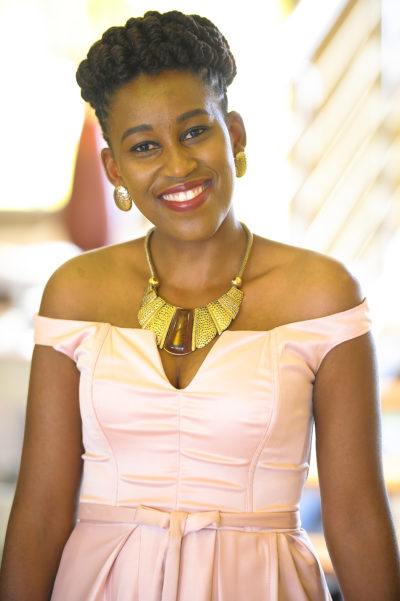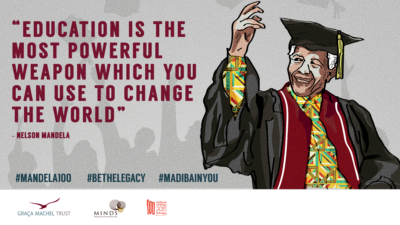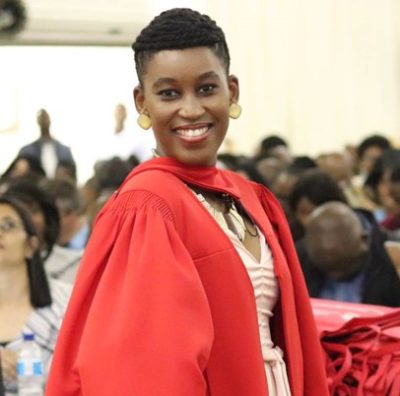Nelson Mandela believed that education could be the most powerful tool that can change the world, and on this Mandela day, we reflect on how this is practically possible. Nqobile Masondo’s story demonstrates that young people are determined to live up to the Mandela legacy of making the world a better place. A doctorate degree (PhD) represents the highest university qualification and working towards achieving a doctorate requires a large amount of academic knowledge one has to continuously work with in a specific field of study. This is what the world needs in order to shape decisions and take better actions for the future.
 For Nqobile, acquiring a PhD in Botany made sense for her because she knew she will help her community.
For Nqobile, acquiring a PhD in Botany made sense for her because she knew she will help her community.
“Botany would shift me to agriculture and allow me to do something relevant that could contribute to people’s lives”.
Dr. Nqobile Masondo is a Graça Machel Scholar and the youngest of five children in a family where education was non-negotiable.
“It was expected of me to go to university. My brothers and sisters expected me to go to university. They told me: you will follow us and we will help you.”
Raised by her factory-worker mother and her grandparents in Madadeni township in Newcastle, South Africa, her family placed a premium on education. Her grandfather sold his cattle to send her eldest brother to university and this set a chain reaction that Nqobile would not escape. Nqobile loved with the laboratory from a young age. Her high school had lab facilities which ended up being used to hold ordinary classes and not science experiments. The environment fascinated her and by the time she completed high school she was sure she wanted to become a scientist. Driven by the love for science, she enrolled for a biochemistry and biology degree at Sefako Makgatho Health Sciences University. With exposure to various subjects such as biochemistry, zoology, marine biology, Nqobile eventually decided to specialise in botany. After the completion of her first degree, Nqobile registered at the University of KwaZulu-Natal (UKZN) for an honours degree where she remained until she graduated with a PhD in Botany in 2018.
Her particular interest is in working with traditional leafy vegetables (imifino/morogo), medicinal plants and organic fertilisers. Her PhD thesis focused on enhancing Southern African indigenous plant growth using organic fertilizers. Her trial was on a particular species known as wild foxglove (udonqa in isiZulu). Nqobile is currently pursuing post-doctoral studies at Stellenbosch University where she is working with medicinal plants. Concerned by the rapid loss and extinction of some of the plant varieties useful to traditional and modern medicine practitioners, Nqobile’s research is focused on plant molecular biology and regulating the production of particular compounds in plants that are used for medicinal purposes. She holds a unique balance between the lab and community, understanding the value of plants and people’s interaction with them. She aims for her research and science to impact the community, responding to their needs and learning from them.
The aim of the Graça Machel Scholarship Programme is to educate and skill a pool of women that will take leadership roles in non-traditional and underrepresented sectors in science, engineering and technology. Nqobile exemplifies this. She says the scholarship provided her with the financial security and freedom to pursue her studies. Being part of a network of scholars has afforded her the opportunity to interact with people of different skills, backgrounds and interests. “This has afforded me with a keen interest and understanding of how I can use my skills in working with the community, add value in my research and contribute to the growth of the African continent”. She recalls how she has had to fight harder as a woman to be taken seriously and prove her credentials. Scholarships are competitive and she had to ensure that her work is of top quality and of value to society in order to be considered.

Multiplying faces Amplifying Voices
Nqobile was one of the few black women in her Honours class and amongst the youngest students during her Master’s degree in UKZN. Her older lab mates grew to become her mentors and saw potential in her when she sometimes could not see it herself. Being confronted with racism and sexism is challenging and can curtail ambition. It is not easy to confront this on one’s own and a support system is critical and central to one’s success. Nqobile readily acknowledges this, particularly her family and her colleagues saying “I have met people who have given me the tools to continue with my goals and vision especially in research. I have trained and gotten an opportunity to gain knowledge and a better understanding of myself which has helped me grow professionally.
I had people at UKZN who groomed me to be where I am right now. I was provided with support and given resources to be able to achieve the goals that I have”. Without this she might not have continued with her studies and there are many who do not. She is determined to help retain as many young black female scientists and is aware of the challenges they face in transitioning to university and keeping up with the pressures of being an academic, family and life in general. She has started an outreach programme to undergraduate students with a background similar to her and relate to them as they enter university environments, often foreign to them. She uses her experience and that of her friends to shape them and help them with what they are going through. She admits that in life nothing comes easy. “We want to open an NGO where we talk with learners and to prepare them for university life, especially those from backgrounds that are not financially secure. Success is not only about financial status but depends on other things like the passion that you have.”
 Her experiences in academia have sowed a seed in her to continue to encourage young students who need guidance and to shape future generations. She feels called to do this, as responsibility to do good to others as they did unto her. “I have grown to have a desire to help those that come after me and to see more women in research and in the sciences, particularly black women”. Education has been an empowering tool for Nqobile and her family and believes many can benefit as she has done: “We cannot put any value to education – once you have a degree no one can take it away from you. I want to give to other people what I have received myself.”
Her experiences in academia have sowed a seed in her to continue to encourage young students who need guidance and to shape future generations. She feels called to do this, as responsibility to do good to others as they did unto her. “I have grown to have a desire to help those that come after me and to see more women in research and in the sciences, particularly black women”. Education has been an empowering tool for Nqobile and her family and believes many can benefit as she has done: “We cannot put any value to education – once you have a degree no one can take it away from you. I want to give to other people what I have received myself.”
What change do you want to see happening in your community? You hold the power to ensure that this transformation happens. To learn more about the Graça Machel Trust’s Scholarships Programme please click here










 The Trust supports and mobilises civil society networks on issues of ending child marriage, ending violence against children, ending female genital mutilation and promoting children’s rights, to carry out advocacy and action across Africa. Special focus is placed on Malawi, Mozambique, Tanzania and Zambia where child marriage continues to be a problem largely driven by poverty, gender inequality, harmful traditional practices, conflict, low levels of literacy, limited opportunities for girls and weak or non-existent protective and preventive legal frameworks.
The Trust supports and mobilises civil society networks on issues of ending child marriage, ending violence against children, ending female genital mutilation and promoting children’s rights, to carry out advocacy and action across Africa. Special focus is placed on Malawi, Mozambique, Tanzania and Zambia where child marriage continues to be a problem largely driven by poverty, gender inequality, harmful traditional practices, conflict, low levels of literacy, limited opportunities for girls and weak or non-existent protective and preventive legal frameworks.




 Education is a fundamental right for all children, which is also a vehicle for social, economic and political transformation in communities, countries and the African continent at large. Recent studies indicate a lack of progress in some of the critical commitments aimed at improving education quality, access, retention and achievement, particularly for girls. In most African countries, girls may face barriers to learning, especially when they reach post-primary levels of education. By implementing multi-dimensional approaches to education which includes core education, personal development, life skills and economic competencies, the Trust partners with funding partners, governments, civil societies and the private sector to improve education access.
Education is a fundamental right for all children, which is also a vehicle for social, economic and political transformation in communities, countries and the African continent at large. Recent studies indicate a lack of progress in some of the critical commitments aimed at improving education quality, access, retention and achievement, particularly for girls. In most African countries, girls may face barriers to learning, especially when they reach post-primary levels of education. By implementing multi-dimensional approaches to education which includes core education, personal development, life skills and economic competencies, the Trust partners with funding partners, governments, civil societies and the private sector to improve education access.

 The Nutrition and Reproductive, Maternal, New-born, Child and Adolescent Health and Nutrition, (RMNCAH+N) of the Children’s Rights and Development Programme aims at promoting the Global Strategy for women, children and adolescents’ health within the Sustainable Development Goals (SDG) agenda. The strategy emphasises on the importance of effective country leadership as a common factor across countries making progress in improving the health of women, children and adolescents.
The Nutrition and Reproductive, Maternal, New-born, Child and Adolescent Health and Nutrition, (RMNCAH+N) of the Children’s Rights and Development Programme aims at promoting the Global Strategy for women, children and adolescents’ health within the Sustainable Development Goals (SDG) agenda. The strategy emphasises on the importance of effective country leadership as a common factor across countries making progress in improving the health of women, children and adolescents. Through its Early Childhood Development (ECD) plan, The Trust will seek to put into action the new science and evidence Report that was presented by Lancet Series on Good and early development – the right of every child. This will be achieved by mobilising like-minded partners to contribute in the new science and evidence to reach all young children with ECD. The Trust’s goal is to be a catalyst for doing things differently, in particular, to rid fragmentation and lack of coordination across ECD sectors. In response to evidence showing the importance of political will in turning the tide against the current poor access and quality of ECD. Even before conception, starting with a mother’s health and social economic conditions, the early years of a child’s life form a fundamental foundation that determines whether a child will survive and thrive optimally.
Through its Early Childhood Development (ECD) plan, The Trust will seek to put into action the new science and evidence Report that was presented by Lancet Series on Good and early development – the right of every child. This will be achieved by mobilising like-minded partners to contribute in the new science and evidence to reach all young children with ECD. The Trust’s goal is to be a catalyst for doing things differently, in particular, to rid fragmentation and lack of coordination across ECD sectors. In response to evidence showing the importance of political will in turning the tide against the current poor access and quality of ECD. Even before conception, starting with a mother’s health and social economic conditions, the early years of a child’s life form a fundamental foundation that determines whether a child will survive and thrive optimally.